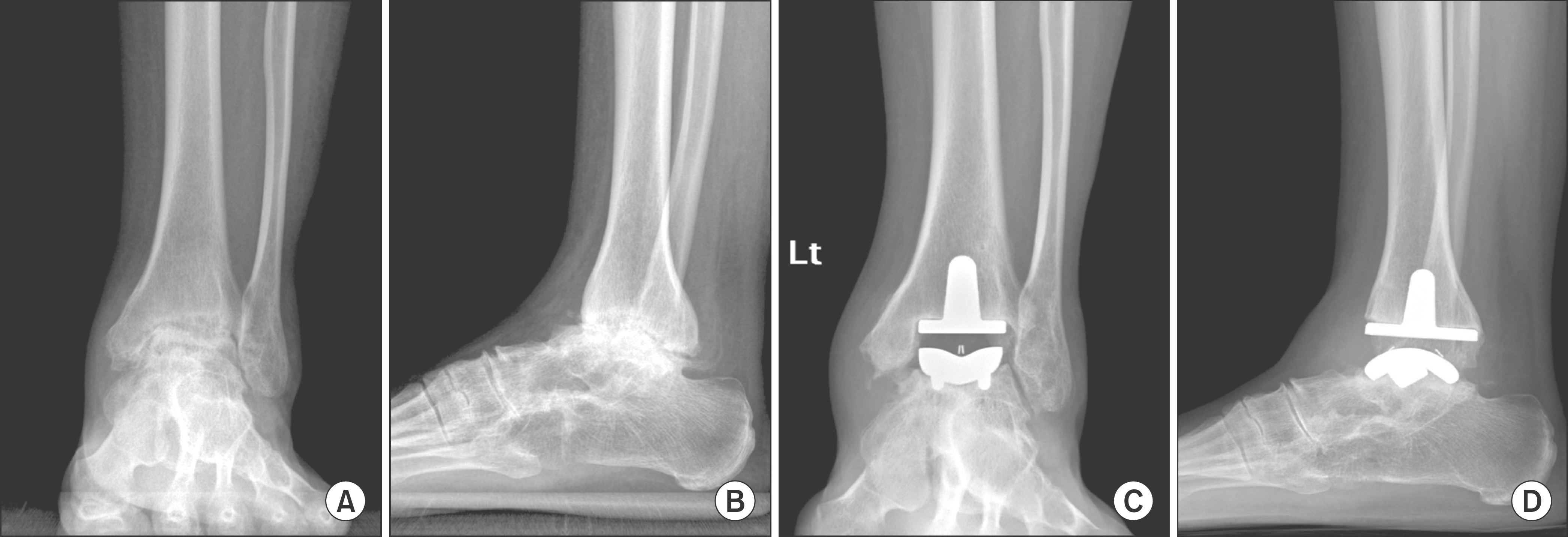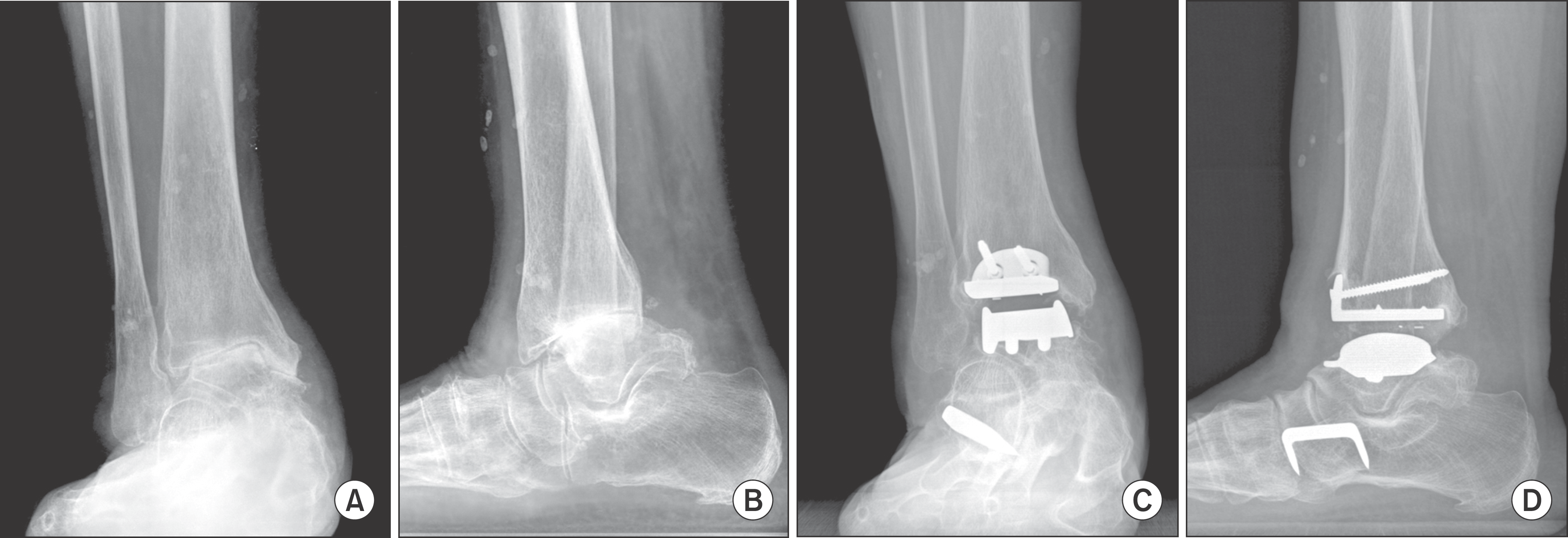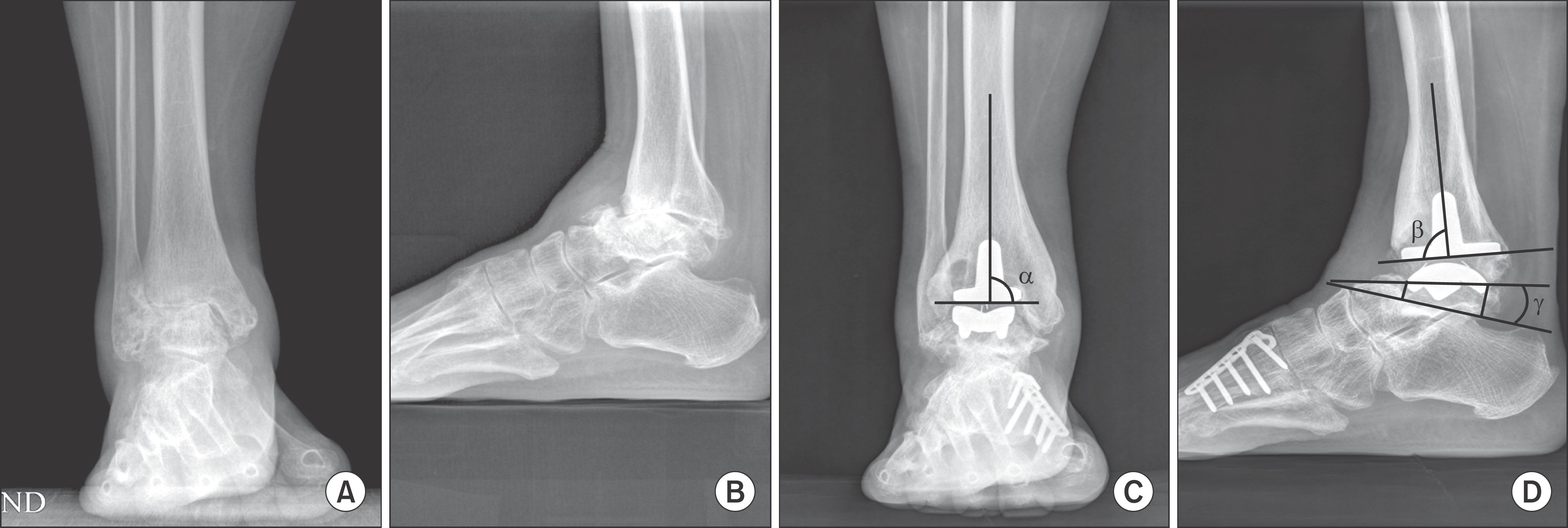Abstract
Total ankle replacement has been performed for treatment of end stage arthritis of the ankle, hopefully being an alternative to ankle arthrodesis. However, due to its high failure rates, earlier versions of ankle replacements were not regarded as successful procedures. The latest design has shown increasingly positive results. Total joint replacement of the ankle itself is still regarded as a demanding procedure and much more challenging than that of the hip and knee in many aspects. Several studies, however, have pointed out that it is becoming the viable, accepted alternative for arthrodesis with advanced implants, appropriate patient selection, and proper training experience of procedures. Compared with arthrodesis, it shows equal or better outcomes in pain relief, range of motion, and patient’s satisfaction. We are attempting to review its biomechanical characteristics, implant design, indications, complications, clinical outcomes, and survival rate.
REFERENCES
1.Gougoulias N., Maffulli N. History of total ankle replacement. Clin Podiatr Med Surg. 2013. 30:1–20.

2.Conti SF., Wong YS. Complications of total ankle replacement. Clin Orthop Relat Res. 2001. 391:105–14.

3.Saltzman CL. Perspective on total ankle replacement. Foot Ankle Clin. 2000. 5:761–75.
4.Saltzman CL., Mann RA., Ahrens JE., Amendola A., Anderson RB., Berlet GC, et al. Prospective controlled trial of STAR total ankle replacement versus ankle fusion: initial results. Foot Ankle Int. 2009. 30:579–96.

5.Barg A., Knupp M., Hintermann B. Simultaneous bilateral versus unilateral total ankle replacement: a patient-based comparison of pain relief, quality of life and functional outcome. J Bone Joint Surg Br. 2010. 92:1659–63.
6.Barg A., Elsner A., Chuckpaiwong B., Hintermann B. Insert position in three-component total ankle replacement. Foot Ankle Int. 2010. 31:754–9.

7.Hintermann B., Barg A., Knupp M., Valderrabano V. Conversion of painful ankle arthrodesis to total ankle arthroplasty. J Bone Joint Surg Am. 2009. 91:850–8.

8.Deland JT., Morris GD., Sung IH. Biomechanics of the ankle joint. A perspective on total ankle replacement. Foot Ankle Clin. 2000. 5:747–59.
9.Fukuda T., Haddad SL., Ren Y., Zhang LQ. Impact of talar component rotation on contact pressure after total ankle arthroplasty: a cadaveric study. Foot Ankle Int. 2010. 31:404–11.

10.Adams SB Jr., Spritzer CE., Hofstaetter SG., Jakoi AM., Pietrobon R., Nunley JA 2nd, et al. Computer-assisted tibia preparation for total ankle arthroplasty: a cadaveric study. Int J Med Robot. 2007. 3:336–40.

11.van den Heuvel A., Van Bouwel S., Dereymaeker G. Total ankle replacement. Design evolution and results. Acta Orthop Belg. 2010. 76:150–61.
12.Glazebrook MA., Arsenault K., Dunbar M. Evidence-based classification of complications in total ankle arthroplasty. Foot Ankle Int. 2009. 30:945–9.

13.Steck JK., Anderson JB. Total ankle arthroplasty: indications and avoiding complications. Clin Podiatr Med Surg. 2009. 26:303–24.

14.Karantana A., Hobson S., Dhar S. The scandinavian total ankle replacement: survivorship at 5 and 8 years comparable to other series. Clin Orthop Relat Res. 2010. 468:951–7.

15.Goldberg AJ., Sharp RJ., Cooke P. Ankle replacement: current practice of foot & ankle surgeons in the United kingdom. Foot Ankle Int. 2009. 30:950–4.
16.Koivu H., Kohonen I., Sipola E., Alanen K., Vahlberg T., Tiusanen H. Severe periprosthetic osteolytic lesions after the Ankle Evolutive System total ankle replacement. J Bone Joint Surg Br. 2009. 91:907–14.

17.Wood PL., Deakin S. Total ankle replacement. The results in 200 ankles. J Bone Joint Surg Br. 2003. 85:334–41.
18.Queen RM., Adams SB Jr., Viens NA., Friend JK., Easley ME., Deorio JK, et al. Differences in outcomes following total ankle replacement in patients with neutral alignment compared with tibiotalar joint malalignment. J Bone Joint Surg Am. 2013. 95:1927–34.

19.Lagaay PM., Schuberth JM. Analysis of ankle range of motion and functional outcome following total ankle arthoplasty. J Foot Ankle Surg. 2010. 49:147–51.

20.Hsu AR., Anderson RB., Cohen BE. 5 points on total ankle arthro-plasty. Am J Orthop (Belle Mead NJ). 2014. 43:451–7.
21.Choi GW., Choi WJ., Lee JW. Total ankle replacement. J Korean Foot Ankle Soc. 2011. 15:132–8.
22.Canale ST., Beaty JH., Campbell WC. Campbell’s operative ortho-paedics. 12th ed.St. Louis, London: Mosby;2012.
23.Sadoghi P., Liebensteiner M., Agreiter M., Leithner A., Böhler N., Labek G. Revision surgery after total joint arthroplasty: a complication-based analysis using worldwide arthroplasty registers. J Arthroplasty. 2013. 28:1329–32.

24.Lee KT., Lee YK., Young KW., Kim JB., Seo YS. Perioperative complications and learning curve of the Mobility Total Ankle System. Foot Ankle Int. 2013. 34:210–4.

25.Schimmel JJ., Walschot LH., Louwerens JW. Comparison of the short-term results of the first and last 50 Scandinavian total ankle replacements: assessment of the learning curve in a consecutive series. Foot Ankle Int. 2014. 35:326–33.
26.Besse JL., Brito N., Lienhart C. Clinical evaluation and radiographic assessment of bone lysis of the AES total ankle replace-ment. Foot Ankle Int. 2009. 30:964–75.

27.Haddad SL., Coetzee JC., Estok R., Fahrbach K., Banel D., Nalysnyk L. Intermediate and long-term outcomes of total ankle arthroplasty and ankle arthrodesis. A systematic review of the literature. J Bone Joint Surg Am. 2007. 89:1899–905.
28.Coetzee JC., Deorio JK. Total ankle replacement systems available in the United States. Instr Course Lect. 2010. 59:367–74.
29.Wood PL., Karski MT., Watmough P. Total ankle replacement: the results of 100 mobility total ankle replacements. J Bone Joint Surg Br. 2010. 92:958–62.
30.Fevang BT., Lie SA., Havelin LI., Brun JG., Skredderstuen A., Furnes O. 257 ankle arthroplasties performed in Norway between 1994 and 2005. Acta Orthop. 2007. 78:575–83.
31.Labek G., Klaus H., Schlichtherle R., Williams A., Agreiter M. Revision rates after total ankle arthroplasty in sample-based clinical studies and national registries. Foot Ankle Int. 2011. 32:740–5.

32.Easley ME., Adams SB Jr., Hembree WC., DeOrio JK. Results of total ankle arthroplasty. J Bone Joint Surg Am. 2011. 93:1455–68.

33.Gougoulias NE., Khanna A., Maffulli N. History and evolution in total ankle arthroplasty. Br Med Bull. 2009. 89:111–51.

34.Daniels TR., Younger AS., Penner M., Wing K., Dryden PJ., Wong H, et al. Intermediate-term results of total ankle replacement and ankle arthrodesis: a COFAS multicenter study. J Bone Joint Surg Am. 2014. 96:135–42.
35.Gougoulias N., Khanna A., Maffulli N. How successful are current ankle replacements?: a systematic review of the literature. Clin Orthop Relat Res. 2010. 468:199–208.

36.Schuh R., Hofstaetter J., Krismer M., Bevoni R., Windhager R., Trn-ka HJ. Total ankle arthroplasty versus ankle arthrodesis. Comparison of sports, recreational activities and functional outcome. Int Orthop. 2012. 36:1207–14.

37.Lee KB., Park YH., Song EK., Yoon TR., Jung KI. Static and dynamic postural balance after successful mobile-bearing total ankle arthroplasty. Arch Phys Med Rehabil. 2010. 91:519–22.

38.Singer S., Klejman S., Pinsker E., Houck J., Daniels T. Ankle arthroplasty and ankle arthrodesis: gait analysis compared with normal controls. J Bone Joint Surg Am. 2013. 95:e191.
Figure 1.
These are preoperative anteroposterior (A) and lateral (B) radiographs of a 32-year-old woman with rheumatoid arthritis on the left ankle showing severe joint space narrowing, osteophyte, cystic change, and congruency loss of the ankle. These are anteroposterior (C) and lateral (D) radiographs of the left ankle four years after total ankle arthroplasty. It shows well positioned implant and improvement of alignment.

Figure 2.
These are preoperative anteroposterior (A) and lateral (B) radiographs of a 64-year-old woman with end stage arthritis showing severe joint space narrowing and loss of congruency with severe varus deformity of the right ankle, and flatfoot. These are anteroposterior (C) and lateral (D) radiographs at 8 years following operation, showing well positioned implant and improvement of alignment.

Figure 3.
These are preoperative anteroposterior (A) and lateral (B) radiographs of a 59-year-old woman with end stage arthritis and equinovarus deformity showing anterior subluxation and severe joint space narrowing of the right ankle, and flexion position of the first metatarsal. Four years following total ankle arthroplasty, anteroposterior (C) and lateral (D) radiographs show unchanged α, β, and g angles. However, osteolytic and cystic changes appeared above the tibial component.





 PDF
PDF ePub
ePub Citation
Citation Print
Print


 XML Download
XML Download